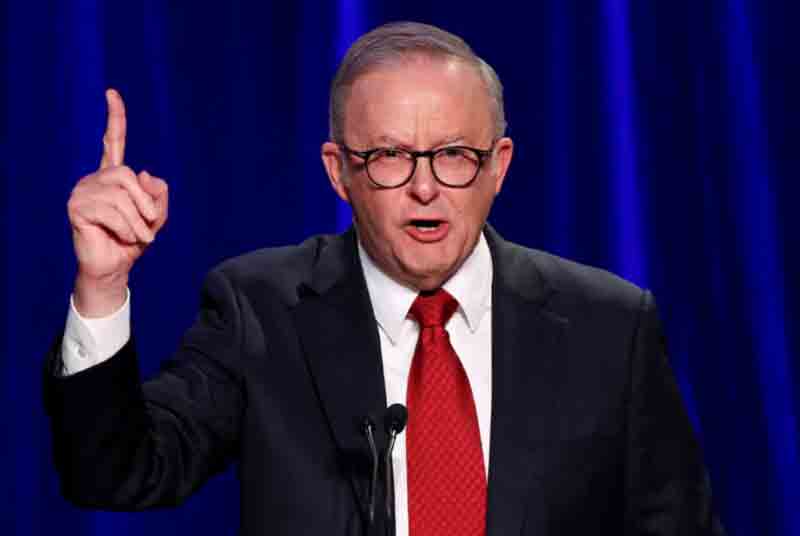Following its significant reelection victory, Australia‘s Labor government will focus on addressing the challenges posed by the U.S.-China trade war, as stated by Treasurer Jim Chalmers on Sunday.
The campaign raised concerns regarding U.S. trade policies and their impact on the global economy. Labor Party leader Anthony Albanese, who has become the first Australian prime minister in two decades to secure a second consecutive term, assured on Sunday that his administration would be disciplined and orderly, emphasizing that Australians voted for unity.
The centre-left Labor Party is projected to increase its parliamentary majority to at least 86 seats from 77, according to the Australian Broadcasting Corporation, despite earlier polls indicating a struggle to maintain its slim majority in the 150-seat lower house.
With approximately three-quarters of the votes counted and counting set to continue on Monday, the outcome mirrors a recent Canadian election where the conservative opposition leader, Peter Dutton, lost his seat as voters shifted their focus from cost-of-living issues to concerns over U.S. President Donald Trump’s extensive tariffs and policies.
Albanese remarked, ‘We will maintain a disciplined and orderly government in our second term, just as we did in our first,’ during a visit to a coffee shop in his Sydney electorate, a place he fondly recalled visiting with his late mother as a child.
He further stated, ‘The Australian people voted for unity rather than division.’ For nine months leading up to March, polls indicated Labor was trailing the conservative coalition amid widespread dissatisfaction with the government’s inflation management. However, the situation changed when the conservatives proposed significant cuts to the federal workforce, drawing comparisons to the Trump administration’s reductions in government agencies.
Additionally, a plan to mandate federal employees to return to the office five days a week faced criticism for being particularly unfair to women.
Trump’s tariff announcement on April 2 heightened voter anxiety, sending shockwaves through global markets and raising worries about the effects on pension funds. Despite concerns regarding Trump’s influence on the global economy, centrist politicians are not gaining traction universally.
In Britain, the populist Reform UK party, led by Nigel Farage—who considers Trump a close ally—achieved significant victories in local elections at the expense of the two major parties. Although Farage has distanced himself from Trump regarding tariffs and Ukraine, he continues to emphasize immigration issues.
In Romania, the re-run of last year’s annulled presidential election on Sunday could elevate hard-right politician George Simion, who claims alignment with Trump’s ‘Make America Great Again’ movement, to a position of power. Analysts suggest that the Trump administration’s decision on Friday to remove Romania from the U.S. visa-free travel program may strengthen Simion’s support by signaling a failure of Romania’s pro-Western government.
Treasurer Jim Chalmers remarked to the Australian Broadcasting Corp., ‘Our immediate concern is the global economic uncertainty, particularly between the U.S. and China, and its implications for us.’ He added, ‘The ongoing situation, especially between the U.S. and China, casts a significant shadow over the global economy… We must be equipped to manage this uncertainty, and we will be.’ U.S. and Chinese representatives, along with global leaders, extended their congratulations to Albanese and his party.
Secretary of State Marco Rubio stated, ‘The U.S. looks forward to strengthening its partnership with Australia to further our shared interests and promote freedom and stability in the Indo-Pacific and worldwide.’
A representative from China’s foreign ministry stated that the nation is prepared to collaborate with the newly elected Australian government to further develop a more mature, stable, and productive comprehensive strategic partnership.
Meanwhile, senior members of Australia’s conservative coalition have started to assign blame for their electoral defeat as they seek a new leader. Mark Speakman, the leader of the coalition’s primary Liberal party in New South Wales, the most populous state in Australia, emphasized the need for the party to align its values of aspiration, innovation, and opportunity with the state, particularly for women and individuals from non-English speaking backgrounds.
Discover more from Defence Talks | Defense News Hub, Military Updates, Security Insights
Subscribe to get the latest posts sent to your email.





